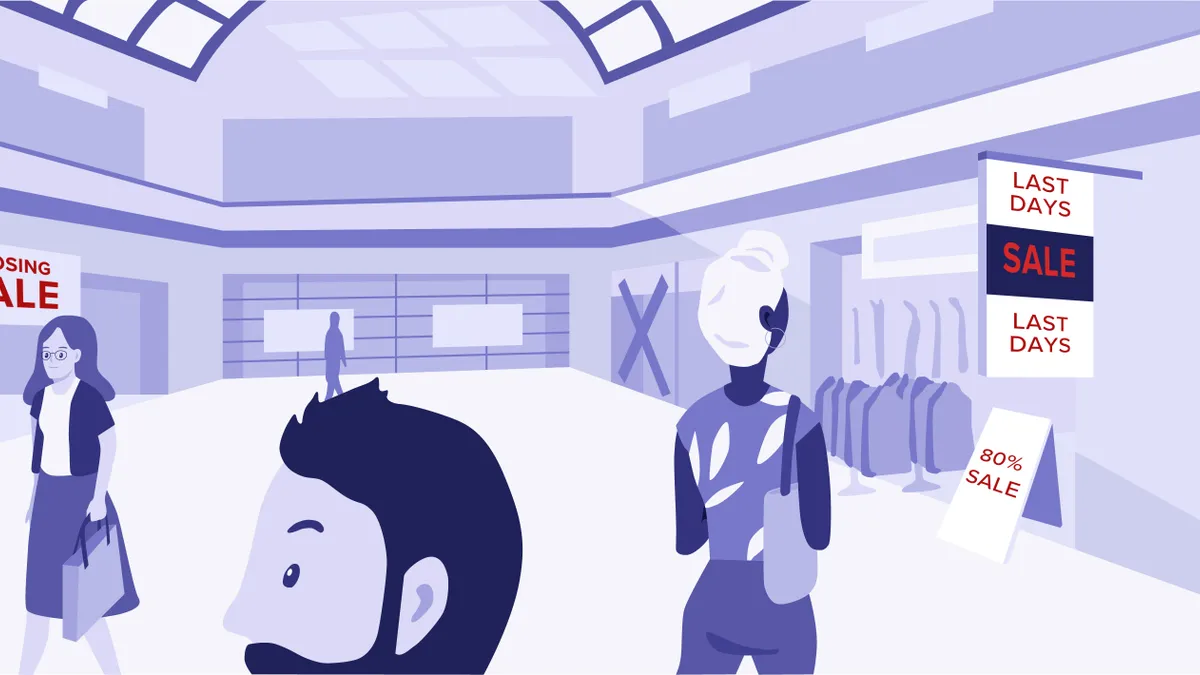Editor's note: We have updated this article to remove references to proprietary data from CreditRiskMonitor. We have also removed references to companies listed in that data.
Each year comes with its own big bankruptcy stories, whether surprise filings or retailers that have been suffering for some time.
A couple of those surfaced in the last few days of 2024. Just before Christmas, Party City filed for bankruptcy for the second time in less than two years, with plans to close all of its stores, and The Container Store entered Chapter 11 with a plan to be acquired by its term lenders. Those stories will continue to play out in 2025, but they were far from the only ones to seek out the courts last year.
Retail Dive tracked close to 20 notable bankruptcies in 2024, including repeat offenders like Rue 21 and relative newcomers like Foxtrot. Some, like Joann and 99 Cents Only, had been at risk for years. Among those that sought out bankruptcy protection were a host of well-known names, including Tupperware, Big Lots and Express.
That being said, the last couple of years have seen a spike of defaults and retail distress will likely decline in 2025, according to Moody’s Ratings Vice President of Corporate Finance Raya Sokolyanska. There are fewer retailers now with weak capital structures because they’ve already filed — and access to capital for at-risk borrowers has also improved.
“Nevertheless, pockets of risk remain, as discretionary retailers are under stress from increasingly purposeful and value-seeking consumer spending, particularly among lower income households,” Sokolyanska said via email. “Home goods, hobby and apparel retailers dominate the distressed retailer list. Home goods retailers continue to be hurt by low home sales, as well as weak demand for pandemic-era favored products. Hobby retailers, such as crafts, are similarly impacted by the consumer pivot to other categories such as experiences.”
Moody’s own distressed list currently features retailers including Joann, Saks Global, Guitar Center and At Home. (Joann filed for bankruptcy for the second time in about a year after this story was initially published). Some of those same companies are of concern to S&P Global Ratings, according to Bea Chiem, retail and consumer managing director at the firm. Chiem noted on a call with Retail Dive that At Home, Guitar Center and Qurate were a few companies with concerning credit ratings and that continued economic softness could lead to more trouble in the sector.
At-risk retailers, according to Moody’s Ratings and S&P Global Ratings
| Name | Sector |
|---|---|
| At Home | Home |
| Joann* | Crafts |
| Saks Global | Luxury |
| Guitar Center | Music |
| Qurate Retail | Video Commerce |
*Joann filed for bankruptcy after this article was published. Source: Moody's Ratings and S&P Global Ratings.
“Even though we're not in a recession, we know that the consumer is stretched,” Chiem said. “They're still pulling back on discretionary purchases and prioritizing necessary items just given the level of inflation that we've seen. And so we do think that potentially there could be more negative rating actions heading into ’25 and there could be a risk of greater defaults next year.”
The impact of tariffs, which President-elect Donald Trump has indicated are coming, could also be a factor this year, as it will likely drive up prices and cause inflation to worsen, harming consumer wallets further. That, of course, will hurt retailers who import more products from abroad, Chiem said, and particularly discretionary categories.
More retailers will file for bankruptcy in the year ahead, the question is simply who they will be. While it’s impossible to predict with certainty which businesses will file in a given year, especially as unforeseen circumstances can tip a company over the edge, these insights can help give a sense of what sectors to watch and which retailers specifically may be struggling.
















